This is a list of the occasional posts I've written about a group of related locomotive classes, a particular class or, occasionally, just one locomotive in a class. Sometimes, the profile is numbered, sometimes there's just a verbal description.
Posts are listed in reverse date-of-posting order but, just to confuse, each post describes events any time in the history of the locomotive. Alternately, selecting 'Loco-profile' in the list of 'Labels to select a blog topic' will find all my locomotive profile posts (again, in reverse date-of-posting order).
Another way of searching for posts about a particular locomotive or class is to put a search word or phrase into the Search Box in the page header (with the magnifying glass symbol) because a lot of posts which talk about specific classes or engines haven't been called 'Profiles'.
Loco Profile: D.C. Electric Locomotives in the former Soviet Union 26-Nov-2019
Dugald Drummond and the 'T9' - Historical Background (10) 14-Apr-2017
G.W.R. 0-6-0PT 'Pannier' tank locomotives (9) 5-Jan-2016
The 'Austerity' 0-6-0ST locomotive (8) 27-Oct-2015
Loco-profile 7: 'Sapper' 0-6-0ST 16-Jan-2015
Loco-profile 6: 'Planet' replica 13-Nov-2013
Loco-profile No. 5: The Russian 'E' class 0-10-0 1-Jan-2013
Loco-profile 4: Russian 'FD20' class 2-10-2 24-Aug-2012
Loco-profile 3: Russian 'FDp20' class 2-8-4 24-Aug-2012
Loco-profile 2: Russian 'YeA' Class 17-Aug-2012
Loco-profile 1: "Lion" 1-Jan-2010
[List re-ordered: 4-Sep-2018, updated 19-Dec-2019]
Monday, 27 August 2018
To Altrincham via the former C.L.C.
At the beginning of October 2014, in the post The Cheshire Lines Committee, I wrote about the history of that joint railway and, in the section 'THE CLC ROUTES TODAY', I outlined what remains of these lines. That prompted me to make a trip, on 4th October 2014, travelling on the Chester-Manchester and Manchester-Liverpool routes of the former C.L.C. That trip is described here. In turn, that provoked a post about the mechanical signalling arrangements which had largely prevailed in the 1950s (here).
In July 2018, I'd arranged to visit a friend in Altrincham and decided that I'd travel there the 'long way round' (Wolverhampton-Crewe, Crewe-Chester, then Chester-Altrincham on the former C.L.C. line) to see what changes had occurred since that earlier trip described here.
Events of Tuesday, 24th July 2018
I started off on the first bus into Wolverhampton. When I discovered just how much a walk-on rail ticket from Wolverhampton to Altrincham would cost travelling before 09:30, the station staff nearly had to summon medical assistance for me but, gritting my teeth, I concluded the transaction and boarded the next Liverpool service as far as Crewe.
Whilst waiting for the diesel multiple unit shuttle to arrive from Chester, I took more pictures of the polychrome brickwork used in the numerous walls supporting the overall roofing. This use of decoration in otherwise functional building works has fascinated me since I first visited Crewe as a child.
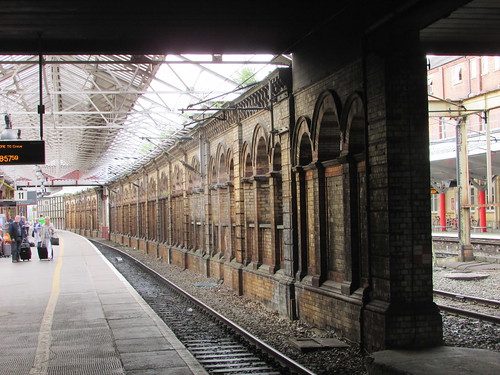
Crewe Station: Polychrome brick wall supporting the overall roofing on platform 11.
The Liverpool train which had brought me from Wolverhampton departed, then a London-bound 'Pendolino' quietly slipped away from platform 6. Later a Cardiff service from Manchester paused for a minute or two in platform 6. Shortly afterwards platform 6 was re-occupied by a 'Pendolino' bound for Manchester. An Electric Multiple Unit which had been waiting north of the station on the Up Liverpool finally sneaked across the complexities of Crewe North Junction to stable in platform 12. As it passed my vantage point, I confirmed my suspicion that this unit was empty stock. The overall impression was how quiet the station remained most of the time, compared with my recollections from steam days. Even when there were train movements, since most were electric, there wasn't much noise.
There was a fair crowd of travellers on bay platform 9 waiting for the arrival from Chester but, just before the train arrived, the public address announced a platform alteration to the next platform across, bay 10, resulting in a mass exodus as people moved to the new platform. By the time everyone had boarded, the 2-car set was full and we immediately set off for Chester where we were routed into bay platform 1.
The Chester and Holyhead Railway provided Chester Station with an imposing set of buildings, now very hacked-about after years of adaptations but still, I think, impressive. For instance, even the stairs for the station footbridge are in brick with carved stone detailing.
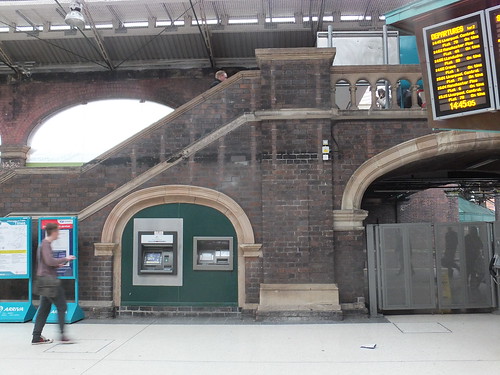
Chester: Original arches and brick and stone stairs adjacent to entrance concourse.
There was time for a few more pictures before I boarded the Class 142 2-car 'Pacer' in bay 6 which would take me to Altrincham. The hourly service from Chester to Manchester via Northwich seemed little changed since my previous trip and still uses 'Pacers'. I've commented before that I'm not a fan of these elderly 4-wheeled monstrosities but my train bowled along gamely with the underfloor bus engines working hard and finally deposited me in Altrincham about right time in just under an hour from leaving Chester.
I only noticed minor changes in the stations and signalling arrangements. Colour light signals prevailed from Chester with its unappealing Power Signal Box, past Mickle Trafford Junction signal box towards Greenbank signal box (both British Railways 'standard' designs).
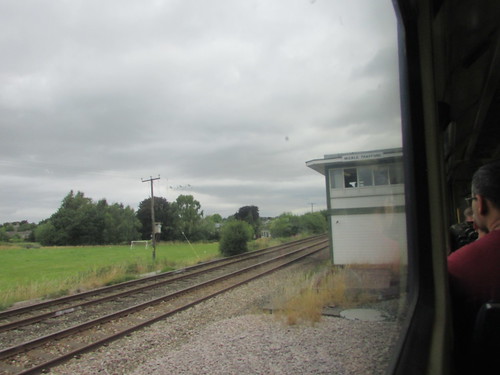
CLC from Chester: Mickle Trafford signal box from a train on the single line to Mouldsworth.
Just before Greenbank, we crossed over the electrified West Coast Main Line. Although the London and North Western manual box at Hartford Junction, a little to the north is long gone, the junction itself remains in a modified form, with a chord which joins the C.L.C. at Greenbank.
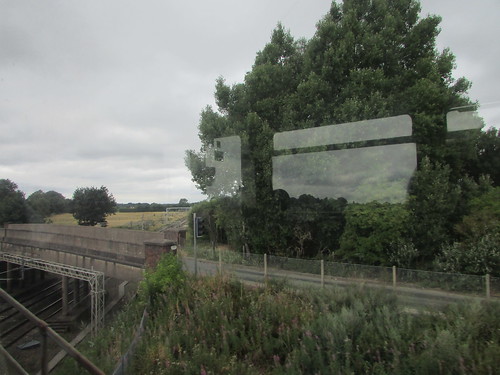
CLC from Chester: Crossing the West Coast Main Line, view looking north.
I noticed that Greenbank station (and probably others) had a different pattern of automatic ticket machine from that in use in 2014. I was glad to see that the Up platform at Northwich retains the extensive range of station buildings with its elaborate platform canopy.
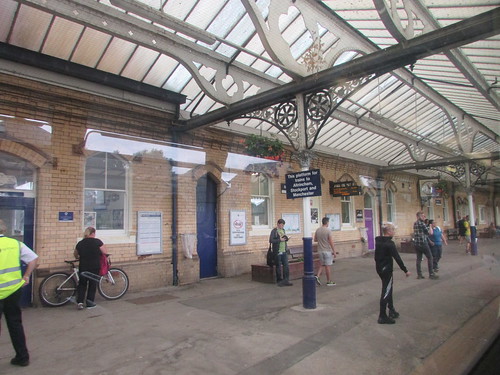
CLC from Chester: Northwich station Up platform.
Lostock Gralam Up platform has one of the dreadful 'bus shelters' plus a modern station nameboard with the interesting invitation:-
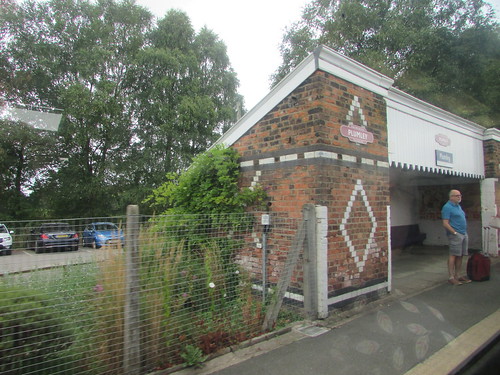 Plumley station: C.L.C. shelter on Up platform.
Plumley station: C.L.C. shelter on Up platform.
We crossed over the M6 motorway, with its inevitable road works on the southbound carriageways and made our stop at Knutsford where the wide Up platform has an attractive canopy with cast iron framework and wooden panels in herringbone pattern.
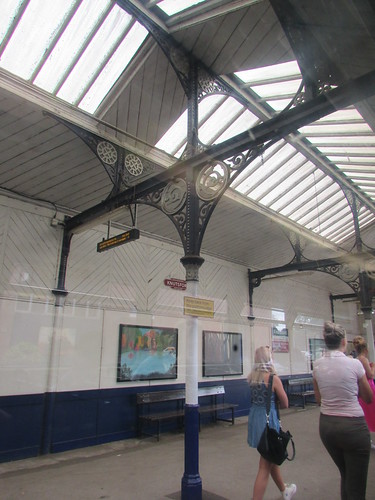
CLC from Chester: Knutsford station Up platform.
My train stopped at Mobberley, Ashley and Hale before I left the train at Altrincham, right time at 10:59.

CLC from Chester: Altrincham station platform 3 with Class 142 about to depart for Stockport and Manchester Piccadilly.
Returning home
Late afternoon, I was back at Altrincham station, now called Altrincham Interchange. In addition to being served by the Chester - Manchester service, it is now the terminus of one of the Manchester Metrolink Lines and a bus terminus is incorporated.

Altrincham Interchange: Modern concourse. The original brick station building can be see left background.
The first railway serving Altrincham was started in 1845 as the Manchester South Junction and Altrincham Railway (MSJ&AR) outlined on Wikipedia here. The expansion of Manchester and the increasing importance of Altrincham as a commuter destination lead to the line being electrified at 1500 volts d.c. in 1931. When the Electric Multiple Units (EMU) became life-expired, British Rail decided to convert the line to 25 kV a.c. and the line re-opened in 1971 using Class 304 EMU. The a.c. service was withdrawn at the end of 1991 to allow the line to be converted, again, this time to 750 volts d.c. and services to Altrincham resumed with modern trams in June 1992 as part of Metrolink. There's an article about these changes in electrification on the Light Rail Transit Association site here.
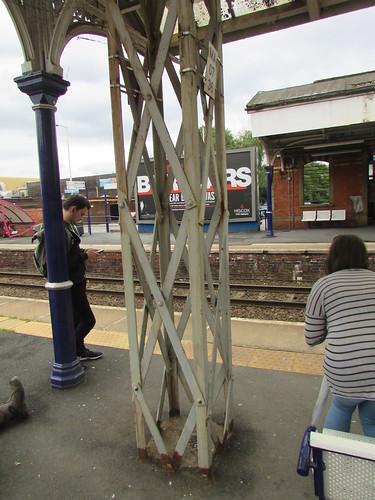
Altrincham: This overhead Line structure, on platform 2/3, with its riveted construction, apprears to date from the 1931 electrification.
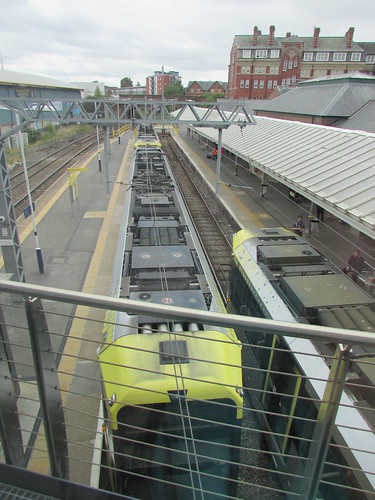
Altrincham: Looking towards the buffer stops on Metrolink platforms 1 & 2, with a 'double tram' on the left and a single tram arriving on the right.
I caught a Chester - Manchester Piccadilly service to Stockport. We were in the afternoon peak, so the miserable 'Pacer' was crowded but I managed to find a seat.
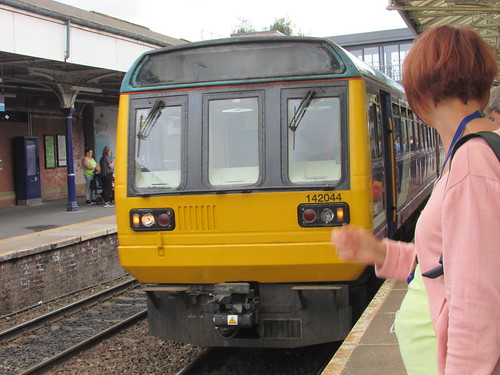 Altrincham Interchange: Manchester train arriving in platform 3.
Altrincham Interchange: Manchester train arriving in platform 3.
It was raining so I couldn't see much on the bumpy, 16-minute journey but I described this interesting route in the post on my earlier trip here.
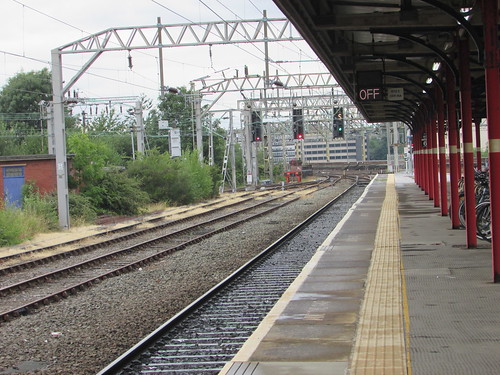
Stockport: View on arrival from Altrincham. The signal is cleared for the Slow Line which the train from Chester will take to Piccadilly.
I made my way through the subway to platform 2 and, within ten minutes, I was boarding a packed Cross Country 'Voyager' which, after brief stops at Wilmslow and Crewe, deposited me at Stafford from where I took a taxi home. Between Wilmslow and Crewe, I caught a glimpse of the Jodrell Bank Radio Telescope, with its massive dish pointing straight up.
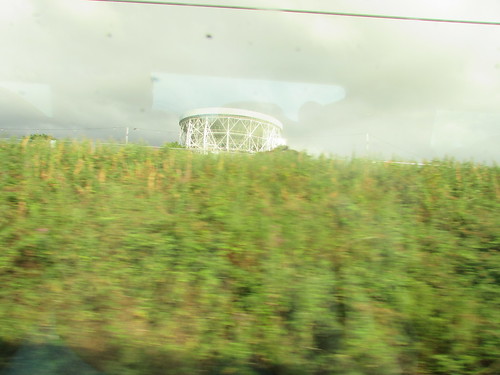
Jodrell Bank Radio Telescope.
My pictures
Where necessary, clicking on an image above will display an 'uncropped' view or, alternately, pictures from may be selected, viewed or downloaded, in various sizes, from one of the albums below. All of these albums were started before the 24th July 2018 and pictures taken on that date have been added to the appropriate album.
West Midland Railways.
Stafford Area rail.
Crewe Area rail.
North Wales Line (Crewe - Llandudno).
CLC Chester - Manchester.
Manchester Metrolink.
Manchester Area Rail.
In July 2018, I'd arranged to visit a friend in Altrincham and decided that I'd travel there the 'long way round' (Wolverhampton-Crewe, Crewe-Chester, then Chester-Altrincham on the former C.L.C. line) to see what changes had occurred since that earlier trip described here.
Events of Tuesday, 24th July 2018
I started off on the first bus into Wolverhampton. When I discovered just how much a walk-on rail ticket from Wolverhampton to Altrincham would cost travelling before 09:30, the station staff nearly had to summon medical assistance for me but, gritting my teeth, I concluded the transaction and boarded the next Liverpool service as far as Crewe.
Whilst waiting for the diesel multiple unit shuttle to arrive from Chester, I took more pictures of the polychrome brickwork used in the numerous walls supporting the overall roofing. This use of decoration in otherwise functional building works has fascinated me since I first visited Crewe as a child.

Crewe Station: Polychrome brick wall supporting the overall roofing on platform 11.
The Liverpool train which had brought me from Wolverhampton departed, then a London-bound 'Pendolino' quietly slipped away from platform 6. Later a Cardiff service from Manchester paused for a minute or two in platform 6. Shortly afterwards platform 6 was re-occupied by a 'Pendolino' bound for Manchester. An Electric Multiple Unit which had been waiting north of the station on the Up Liverpool finally sneaked across the complexities of Crewe North Junction to stable in platform 12. As it passed my vantage point, I confirmed my suspicion that this unit was empty stock. The overall impression was how quiet the station remained most of the time, compared with my recollections from steam days. Even when there were train movements, since most were electric, there wasn't much noise.
There was a fair crowd of travellers on bay platform 9 waiting for the arrival from Chester but, just before the train arrived, the public address announced a platform alteration to the next platform across, bay 10, resulting in a mass exodus as people moved to the new platform. By the time everyone had boarded, the 2-car set was full and we immediately set off for Chester where we were routed into bay platform 1.
The Chester and Holyhead Railway provided Chester Station with an imposing set of buildings, now very hacked-about after years of adaptations but still, I think, impressive. For instance, even the stairs for the station footbridge are in brick with carved stone detailing.

Chester: Original arches and brick and stone stairs adjacent to entrance concourse.
There was time for a few more pictures before I boarded the Class 142 2-car 'Pacer' in bay 6 which would take me to Altrincham. The hourly service from Chester to Manchester via Northwich seemed little changed since my previous trip and still uses 'Pacers'. I've commented before that I'm not a fan of these elderly 4-wheeled monstrosities but my train bowled along gamely with the underfloor bus engines working hard and finally deposited me in Altrincham about right time in just under an hour from leaving Chester.
I only noticed minor changes in the stations and signalling arrangements. Colour light signals prevailed from Chester with its unappealing Power Signal Box, past Mickle Trafford Junction signal box towards Greenbank signal box (both British Railways 'standard' designs).

CLC from Chester: Mickle Trafford signal box from a train on the single line to Mouldsworth.
Just before Greenbank, we crossed over the electrified West Coast Main Line. Although the London and North Western manual box at Hartford Junction, a little to the north is long gone, the junction itself remains in a modified form, with a chord which joins the C.L.C. at Greenbank.

CLC from Chester: Crossing the West Coast Main Line, view looking north.
I noticed that Greenbank station (and probably others) had a different pattern of automatic ticket machine from that in use in 2014. I was glad to see that the Up platform at Northwich retains the extensive range of station buildings with its elaborate platform canopy.

CLC from Chester: Northwich station Up platform.
Lostock Gralam Up platform has one of the dreadful 'bus shelters' plus a modern station nameboard with the interesting invitation:-
Take the TrainThe Lion Salt Works is now a museum, operated by West Cheshire Museums, illustrating the open-pan method of salt production. At least Plumley station retains its simple C.L.C. platform shelter, with patterned brickwork.
Walk the Canal
Visit the Lion Salt Works
 Plumley station: C.L.C. shelter on Up platform.
Plumley station: C.L.C. shelter on Up platform.
We crossed over the M6 motorway, with its inevitable road works on the southbound carriageways and made our stop at Knutsford where the wide Up platform has an attractive canopy with cast iron framework and wooden panels in herringbone pattern.

CLC from Chester: Knutsford station Up platform.
My train stopped at Mobberley, Ashley and Hale before I left the train at Altrincham, right time at 10:59.

CLC from Chester: Altrincham station platform 3 with Class 142 about to depart for Stockport and Manchester Piccadilly.
Returning home
Late afternoon, I was back at Altrincham station, now called Altrincham Interchange. In addition to being served by the Chester - Manchester service, it is now the terminus of one of the Manchester Metrolink Lines and a bus terminus is incorporated.

Altrincham Interchange: Modern concourse. The original brick station building can be see left background.
The first railway serving Altrincham was started in 1845 as the Manchester South Junction and Altrincham Railway (MSJ&AR) outlined on Wikipedia here. The expansion of Manchester and the increasing importance of Altrincham as a commuter destination lead to the line being electrified at 1500 volts d.c. in 1931. When the Electric Multiple Units (EMU) became life-expired, British Rail decided to convert the line to 25 kV a.c. and the line re-opened in 1971 using Class 304 EMU. The a.c. service was withdrawn at the end of 1991 to allow the line to be converted, again, this time to 750 volts d.c. and services to Altrincham resumed with modern trams in June 1992 as part of Metrolink. There's an article about these changes in electrification on the Light Rail Transit Association site here.

Altrincham: This overhead Line structure, on platform 2/3, with its riveted construction, apprears to date from the 1931 electrification.

Altrincham: Looking towards the buffer stops on Metrolink platforms 1 & 2, with a 'double tram' on the left and a single tram arriving on the right.
I caught a Chester - Manchester Piccadilly service to Stockport. We were in the afternoon peak, so the miserable 'Pacer' was crowded but I managed to find a seat.
 Altrincham Interchange: Manchester train arriving in platform 3.
Altrincham Interchange: Manchester train arriving in platform 3.
It was raining so I couldn't see much on the bumpy, 16-minute journey but I described this interesting route in the post on my earlier trip here.

Stockport: View on arrival from Altrincham. The signal is cleared for the Slow Line which the train from Chester will take to Piccadilly.
I made my way through the subway to platform 2 and, within ten minutes, I was boarding a packed Cross Country 'Voyager' which, after brief stops at Wilmslow and Crewe, deposited me at Stafford from where I took a taxi home. Between Wilmslow and Crewe, I caught a glimpse of the Jodrell Bank Radio Telescope, with its massive dish pointing straight up.

Jodrell Bank Radio Telescope.
My pictures
Where necessary, clicking on an image above will display an 'uncropped' view or, alternately, pictures from may be selected, viewed or downloaded, in various sizes, from one of the albums below. All of these albums were started before the 24th July 2018 and pictures taken on that date have been added to the appropriate album.
West Midland Railways.
Stafford Area rail.
Crewe Area rail.
North Wales Line (Crewe - Llandudno).
CLC Chester - Manchester.
Manchester Metrolink.
Manchester Area Rail.
Subscribe to:
Comments (Atom)
